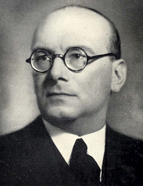

Although the government that followed suspended the implementation of the reform, it would inspire other occupants of the Palácio das Necessidades [headquarters of the Portuguese Ministry of Foreign Affairs]. Between 1922 and 1924, he was in Berlin. While those who admired him continued to praise his actions, which were the result of the trade agreements he negotiated and achieved, those who held him in contempt seized every opportunity to undermine his efforts, plotting the first disciplinary actions against him. While he was trying to defend himself, he was seduced by yet another new Republican party proposal. That of the Radical Republican Party, whose Board he chaired in 1925. The disciplinary proceedings against him were revoked, and he permanently withdrew from party activity. The following years were spent between Prague, Vienna and Budapest, from 1926 to 1933. While those who recognised his worth remained loyal to him, those intent on denigrating him once again resorted to every means to bring two more disciplinary proceedings against him. In 1933, the presidente do Conselho [Prime Minister], who was more attuned to his diplomatic skills than his political convictions, approved his promotion to Minister of First Class and his subsequent posting to Berlin. Until 1940. That year, in June, the looming threat of invasion by German troops forced him to reconsider his decision. Veiga Simões was placed on reserve. For delaying his departure from the German capital, in addition to another disciplinary procedure, he was sentenced to two years of suspension without pay. In 1946, he was offered a job in China. A poisoned gift. A demotion for a diplomat with an established career in Europe. When he delayed his move to the Orient, he was simply dismissed. A decision he appealed. But the judges of the Supreme Administrative Court didn't do him justice.
Although his stay in Prague, Vienna and Budapest, when the financial and commercial agreements with Austria and Hungary had been finalised, turned into a lengthy waiting period until he was appointed again as a diplomat, it did give him the time he needed to deepen his interest in history. He read a lot. Very much so. The latest in historiographical production at the time. Whether th ey were Portuguese historians or f oreign historians. He selected those with whom he identified, to praise them. And refuted the theses of others from whom he distanced himself. But he didn't neglect his sources. Especially in the European centres where he travelled. Where he had access to a wealth of original documentation. Where he was recognised for his analyses of the present and past. In Lisbon, successive heads of Foreign Affairs received requests for authorisation to respond to invitations addressed to him. In 1929, he gave a lecture at the Sorbonne on France and Portugal during the Hundred Years' War. Unfortunately, however, this is one of his texts that has not been located. In 1931, on the occasion of the International Congress of Historical Sciences in Budapest, as well as being chosen as the Portuguese delegate, he was also appointed vice-president of the "Comissão das Grandes Descobertas" [Great Discoveries Commission]. He would have focussed on the sea voyage s to the West before Columbus. A nother speech, however, that remains unknown. That same year, at The Hague Academy of International Law, the audience was able to hear him speak about current issues, specifically the new orientations of international economic policy. The result of this course, to the glee of all those who are interested in economics, can still be read — Les nouvelles orientations de la politique économique internationale , 1932. A year later, at the Institute of Advanced Diplomatic Studies in Brussels, it was the auditorium's turn to hear him speak in French about relations between Portugal and Flanders at the dawn of the capitalist era. This conference too, to the delight of those who appreciate his writing on history, can still be read, both in its original version and in Portuguese La Flandre, le Portugal et les débuts du capitalisme moderne, 1933, or "A Flandres, Portugal e os primórdios do capitalismo moderno", 2004 [Flanders, Portugal and the beginn ings of modern capitalism]. In this lecture, Veiga Simões sought to emphasise the contribution of Portugal and Flanders in laying the foundations of modernity, as far as the economy was concerned. In the 14th century, the Italian cities, which until then had been supplying Europe with oriental products via the Mediterranean, were forced to turn to the Atlantic, using the routes that had long since been inaugurated by Portuguese merchants in their trade with Flanders.
This work is financed by national funds through FCT - Foundation for Science and Technology, I.P, in the scope of the projects UIDB/04311/2020 and UIDP/04311/2020.
